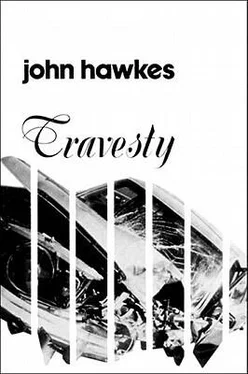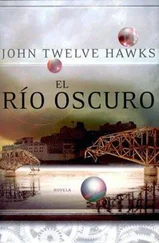And yet who can fail to eulogize our infant Caesar?
He was a fat and contrary tyrant, cher ami, and in his third year he began each of our days by subjugating Honorine and me, and even Chantal, to the essential paradox of his fatness, his pink skin, the crown of authority with which he masked his sweet nature. Admittedly, Honorine is not small. But neither is she large in her bones, in her flesh. How then did she mother a child so beautiful in his naked weight, so fatly and gently erotic for all his recalcitrance and pretended ferocity? We shall never know. He was his own source, I often thought, and he is gone. But I saw his little fat body on the spit as often as I saw it crowned; in the chubbiness and gleam of his totally sweet and spoiled nature he was that desirable, that strong.
Yes, he came to Honorine and me with every sunrise, bold and bare, having stripped off his white nightshirt and wearing only his buttery skin and disapproving frown and air of infant determination. With every sunrise he pulled away the bedclothes not from me but from Honorine, who was always his happy match for nudity. Perhaps you are not able to visualize those mornings. But I see them still: dawn at the window, sunlight falling across our bed from that window and from the rose and plum-colored tapestry on our bedroom wall, the sound of distant bells, the scent of coffee, and the birds in the air and already the small automobiles congregating somewhere on the cobblestones. And then the entrance of Pascal, the open door, the light winking from the long glass handle, and our little naked son approaching us with his pink cheeks and pouting underlip and little penis which Honorine always used to touch with the tip of her finger, as if that tiny sexual organ belonged not to Pascal but to the winged infant cast in bronze. You must see such a morning as clearly as I do, cher ami, if only to know that in fact I am not a person who despises life. Quite the contrary.
But in he would come, pouting, wordless, making his little belly fatter than ever (as might some exotic fish with air) and in my own arousal from sleep I would see his bare plumpness and the light in his fine-spun golden hair. And the lip, the beautiful underlip thrust out and moist in his unmistakable message: that he was the joy of all who saw him, but in return there was nothing in all the world to give him joy. Too ripe, too beautiful, too lordly, pleasing but never pleased- such was the fate and character he had created for himself at that early age. But there he would be, the brown eyes filled with accusation, the sunlight flooding the spot where he stood, the tiny spigot crooked and gleaming in the base of the belly. In that moment the faun in the tapestry would quiver at the sight of him and the silver dove on Honorine's commode would fly.
Well, it was always the same. He would wait until I had had my awesome look at him and until Honorine had begun to smile in her feigned sleep and to make her soft welcoming sound, and then cloaked in all his slow assurance he would march across the carpet and reach out one chubby hand and pull the bedclothes from his mother's nude, youthful body. For a moment the two of us, Pascal and I, would gaze on Honorine, who would continue to conceal her wakefulness and, for our sakes, would incline her cheek toward the pillow and arch her back and stretch out an arm and luxuriate in the aroma of her night's perfume.
Do you see her? Do you see Pascal and me? Are you listening?
Well, after that moment, and as if he had received an invisible and all-important sign of acquiescence from Honorine, little Pascal would begin to climb. Yes, with great deliberation he would climb onto our bed (the very same antiquity in which at present Honorine lies sleeping) and then climb onto his mother's warm and well-shaped body. Yes, with frowning difficulty he would mount that body, straddle the hips, seat himself, position himself, until his rosy and sturdy little buttocks were firmly, squarely in place atop Honorine's cluster of purple grapes. There he would sit. Enthroned. And he was quite aware of how he was sitting and how thoroughly his own baby flesh covered and cushioned the flesh of his mother's grapes. I knew what he knew because there was no mistaking the way he would glance in my direction, settle his weight, and then raise his chin in a perfect gesture of self-satisfied defiance.
Then Honorine would open her eyes, she would laugh, she would seize both his hands in hers, with her hips and stomach she would imitate the gait of a trotting horse. Again and again she would murmur cheri and beg for a kiss, which he always refused to give her. As for me, at that moment I would wish my little Pascal a good morning, to which inevitably he replied that it was not a good morning but a bad one.
There he would sit holding us in the power of his princely manner and infant eroticism until at last and rubbing her eyes, poor Chantal would appear obediently to haul him away.
How did Honorine survive his death? How did I? But if he had lived, his little body growing and his infant eroticism maturing into impressive masculinity and his head day by day swelling to the round of the laurels, still he would have fared no better than poor Chantal. Actually, he would have fared much worse.
But I myself cloaked his little stone cross in satin. So it is not as if I have never known what it is to grieve.
But perhaps I am the man little Pascal might have become had he lived. Perhaps it is he who inhabits me now in his death. Who knows?
You will not believe it, but only this morning I visited for the last time my one-legged doctor. Yes, only hours ago and on this of all days, I held up my end of our yearly medical rendezvous. But I am attentive to your every nuance, even to the nuances of your stubborn silence, and now despite your misery and against your will you are objecting to yourself that my concern for my health on the day of my premeditated death (and yours, and Chantal's) is worse, much worse, than rabbits, rain, the invisible motion picture camera with its wet distended lens, the emotional orchestration of the radio you refused to hear. At first glance you would appear to be right: illusory circumstances are beginning to justify your horrified contempt for a man who might be engaged in committing drastic actions not from clarity and calculation but merely to satisfy his inmost urge to saw away on the tremulous violin of his self-love. And yet once again you are wrong. Wrong. Because it was not I who was responsible for this morning's appointment with the crippled physician but rather that elderly woman with the girlish body who is the doctor's nurse and secretary combined. It is true: she notified me of today's appointment long after I myself had figuratively torn today's blank page from my appointment book. And what do you think of the fact that the doctor's rooms are situated directly across from the very restaurant which you yourself happened to choose for your dinner this evening with Chantal, the doctor's rooms and the restaurant facing each other on opposite sides of that same little public garden where the lovers sit holding hands on the cold benches? In other words, this morning while waiting for my medical examination to commence, and stripped to the waist in anticipation of needles and the doctor's archaic X-ray machine, I myself stood at a dusty window in shivering contemplation of the exact same suffering old palm tree which you and Chantal regarded this evening over your soup and wine. But you are already familiar with the pleasure I take in these alignments which to me are the lifeblood of form without meaning.
At the appointed hour, then, I touched the bell button, noting as usual the pathetic opulence of the brass nameplate, and climbed the obviously little-used cold stones to the almost empty room where I inhaled the first trace of that antiseptic smell in which in a few moments I would be engulfed. I heard the air stirring in the rest of his chambers, noted in several chipped, white ceramic ash trays the week-old remains of his dead cigarettes. Of course I was well acquainted with his habit of dragging himself to this very room and seating himself and smoking his cigarettes, reading one of the ancient journals, the doctor waiting alone in the room intended for patients who were never there.
Читать дальше












